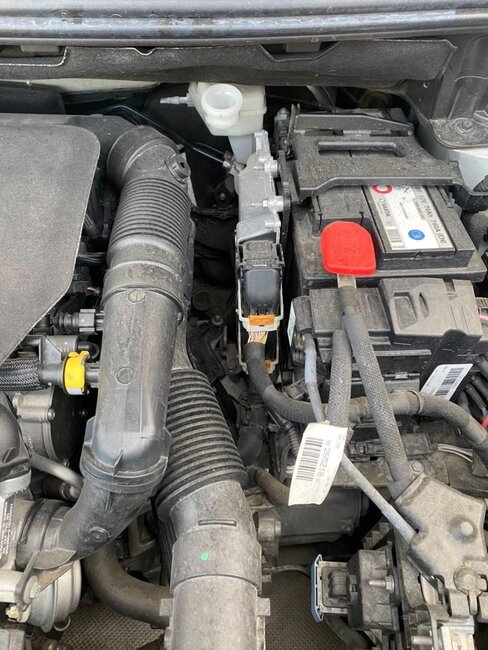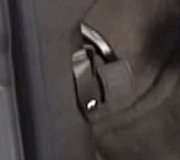No air gets into the system just because the reservoir cap is left off. The hood opened or closed has nothing to do with this. The problem is brake fluid loves to absorb moisture out of the air. That's why it's important to keep containers of brake fluid sealed. Three things happen when the brake fluid reservoir is not sealed. The moisture leads to corrosion of metal parts over time, it speeds up the normal corrosion that develops in the lower halves of the bores in the master cylinder, and it lowers the boiling point of the brake fluid from well over 400 degrees Fahrenheit to closer to 212 degrees, (the boiling point of water). That leads to one form of brake fade when the moisture turns to vapor. That vapor can be compressed resulting in a low and mushy brake pedal.
Moisture gets into brake fluid over time even when the system is sealed. It's for that reason every manufacturer has a recommended interval when the fluid should be replaced. Very few of us actually do that because these systems have been so trouble-free.
Before I describe the recommended remedy, let me explain about the level of the brake fluid in the reservoir. Your vehicle will have disc brake calipers on the front, and possible on the rear. As the linings wear, the pistons in those calipers gradually work their way out. That's how all calipers self-adjust. As those pistons move out, brake fluid fills in behind them. You'll see that as the fluid level in the reservoir goes down over time. This is one fluid we never top off during other routine services such as oil changes. If no other problems develop, when it's time for a normal maintenance brake job, we have to retract those pistons back into the caliper housings to make room for the new, thicker brake pads. Doing that pushes all that brake fluid behind them back up into the reservoir. At that time the level will be full again. If anyone added brake fluid before that, it's going to overflow, causing a mess on the floor. Brake fluid also loves to eat paint, so it must be washed off with water right away.
The point is you want to end up with the fluid level the same as it is right now. This is not worthy of panicking, but the best recommendation is to bleed out the old brake fluid and replace it with new. You'll create more problems if you allow the reservoir to run empty, and that can be a real lot more frustrating if the vehicle has anti-lock brakes. All the grief and agony can be avoided by keeping some fluid in the reservoir at all times. What I would do is open one bleeder screw by one wheel, and just let gravity do its thing. That can take some time, as in as much as an hour, before new clear fluid shows up. If you want to speed this up, "irritate" the brake pedal with your hand a little. To bleed one front wheel typically uses up roughly half of what is in the reservoir. Do this at the other front wheel, but keep an eye on the level in the reservoir. Let it get to almost empty, then refill it with new fluid. If you add new fluid too soon, you'll just be diluting the old stuff, making it harder to get as much moisture out as possible.
Do each rear wheel the same way. You'll never get 100 percent of the moisture out. The goal here is to get as much out as possible. It's normal for old brake fluid to turn dark due to being hot. New brake fluid is clear. When you see clear fluid coming out of a bleeder screw, you can consider that wheel done. I use a clear plastic hose connected to the bleeder screws so I can run the fluid into a container. If you don't do that, consider washing the tire and caliper with Brake Parts Cleaner from a spray can to clean the area. That will prevent someone else from thinking there's a leak that needs to be addressed.
The most important point with brake fluid is it must never ever be contaminated with a petroleum product. That includes engine oil, power steering fluid, transmission fluid, axle grease, or penetrating oil. Repairs for contaminated fluid gets to be very expensive as all parts that contain rubber parts that contact the brake fluid must be replaced. It's common to find the rubber bladder seal in the reservoir cap has been pulled down over time. Professionals even wash their hands with soap and water before poking that seal back into the cap, to avoid getting fingerprint grease on that seal. Fortunately moisture in the fluid doesn't cause the same problems as petroleum products do.
Here's a link to a related article you might find useful:
https://www.2carpros.com/articles/how-to-bleed-or-flush-a-car-brake-system
Be aware they're going a lot further than you need to and they're addressing other problems that you don't have. The bleeding part is what is of interest. If you use your foot on the brake pedal to speed up the process, a good habit to get into is to never push the pedal all the way to the floor. Doing so is likely to not cause a problem on a vehicle as new as yours, but over time it is normal for crud and corrosion to build up in the parts of the master cylinder where the rubber seals don't normally travel. By pushing the pedal to the floor, you run those seals over that crud which can rip them. That results in a slowly sinking brake pedal, and that often takes two or three days to show up. The master cylinder must be replaced to fix that. It's far safer to just never push the pedal to the floor.
Let me know if this addresses your concerns.
Friday, May 12th, 2023 AT 6:12 PM



